“There Are Assumptions About The Film That Are Easily Debunked By Watching It.” Interview With Minhal Baig, Director Of HALA
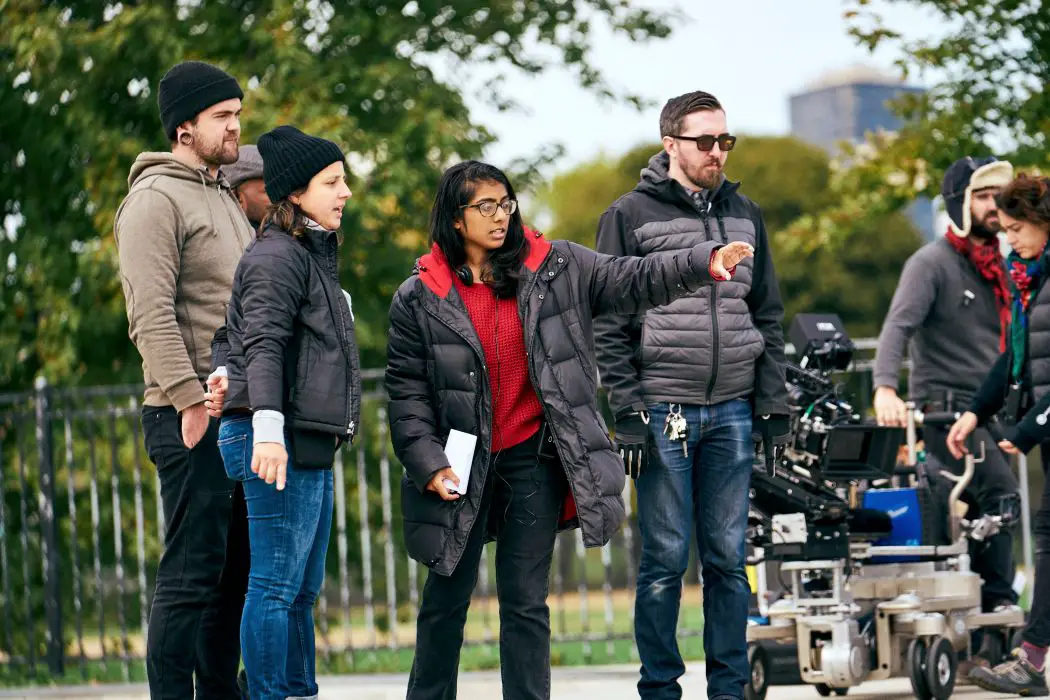
Musanna Ahmed is a freelance film critic writing for Film…
Misrepresentation is always going to be a charge faced by any writer who depicts a veiled Muslim character. Hala was forced to bear the brunt of critical assumptions by a trailer that just didn’t quite capture what the movie is really about.
Far more nuanced than the preview suggests and far thematically richer than social media has assumed, Minhal Baig‘s debut feature thoughtfully treads through the cultural and ideological territory intrinsic to the coming-of-age story about a Pakistani girl at the crossroads of student life. The filmmaker marries an American indie aesthetic with a uniquely immigrant narrative for something fresh, vital and worthwhile, led by a terrific Geraldine Viswanathan in the titular role.
In this extensive interview, I spoke to Baig about audience preconceptions, portraying the diaspora, her family’s response, the heroine’s journey, piano scores, 35 Shots of Rum, Geraldine Viswanathan, Ms. Marvel and much more.
Musanna Ahmed for Film Inquiry: The life of Hala began as a short film from which you’ve retained some of the same narrative elements. How much has the development of the story changed from then to now?
Minhal Baig: A lot of it. The short was always just going to be a proof of concept for a feature and the intention for the feature was to make it more about the family rather than focusing on the relationship. But the reason the short focused on the subplot, the romantic relationship between Hala and Jesse, was because it contained story. It was difficult to make a short film that had a complete beginning, middle and end with the family because there’s so much going on and I didn’t wanna choose between showing the relationship just between Hala and her father or just between Hala and her mother.
When the short came out, though, the response was positive and a large part of it pointed to the relationship with her family. More people were interested in how she related to her parents and that was useful because I intended to go in that direction anyway. I put the parents front and centre in the feature because I knew that was going to be the unfamiliar part of the story in the sense that it’s not something we get to see as much as the romantic story. That was the biggest change and the second biggest was that the girl who was cast in the short was Iranian-American.
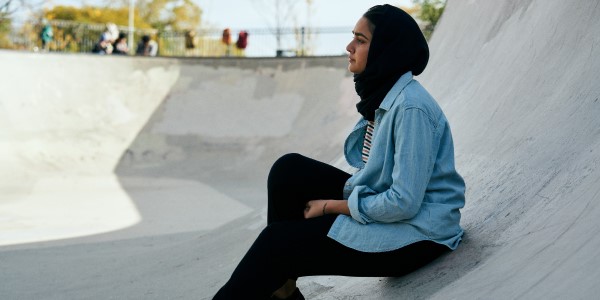
I didn’t necessarily intend for everyone to be Iranian-American, it was just that I cast her first because she had the strongest tape so I had to cast the entire family as Iranian. For the feature I wanted the family to be Pakistani-American and I think people assumed I wanted to make the characters look more like my family. (laughs) That is partly the case but also we had such limited resources on the short that I just wanted someone who could be that character honestly and be of a background where there is a Muslim population.
I don’t think any non-Pakistani-American could have made this film, it shows in the mise-en-scene and the language and even in the dynamic of the house. I’m back at my parents’ house for the holidays and the same sort of geographical and emotional territory is familiar to me. I love the post you shared on Instagram captioned “When people ask me if Hala is a love story, I tell them yes, it’s a love story between her and her mother.” I think that’s palpable but at the same time I’m seeing reactions from certain people who haven’t watched the film but have seen the trailer and are saying “Oh God, a film where the brown girl falls in love with a white boy who’ll liberate her.” Why do you think the communication between your intention and these preconceptions has been lost?
Minhal Baig: I think what’s hard about the criticism of the trailer is that for story reasons, the relationship serves a purpose. It was clear to me when I wrote this film that her love interest, whomever that would be, he wouldn’t be someone for whom Hala ever abandons her family, or her culture or her faith. It also had to be someone who would not be able to understand what’s going on in her home. There were people who asked me, “Why isn’t it a Muslim boy?” and my honest answer is that if it was a Muslim boy then he may be able to better understand her and that would change the story.
Then it’s not a story about her and her mom so much anymore as it is a story about her and him. The story with her mother is more subtle, the one that emerges as the essential one but takes a long time to get there. Part of that is because it reflected my real life – when I was Hala’s age, I felt that my mom was an obstacle to my goals and she couldn’t understand what was going on in her life. I did a lot of the things that Hala does in the movie, like not really talking to her mom about things that are going on in her school, but as I got older that I understood I had more in common with my mom than I’d assumed.
It required me to open up my perspective and lose my tunnel vision to see her as a real person and stop marginalising her. If I started the movie that way, that we fully understand her mom’s perspective, then we’re not in Hala’s perspective anymore. It needed to be that she’s in the corner for part of the movie and being let in and that’s a hard thing to convey in a trailer. (laughs) It’s subtle, I didn’t want the characters to change overnight. It’s a quieter relationship, not one you can portray so effectively in a trailer.
Right. I think the interracial relationship will always be a knotty thing. I remember when The Big Sick came out and there was an article released entitled “I’m Tired of Watching Brown Men Fall in Love With White Women”, pointing to that film as well as the documentary Meet the Patels, though both were real stories. Plus, something people won’t know until they watch Hala is the conclusion of the romantic arc between Hala and Jesse.
Minhal Baig: I understand where the criticism comes from, it comes from a place of pain and not being represented the way people want themselves to be represented, particularly brown women not seeing their relationships reflected on screen. I think the way to address that, though, is more systemic than any individual story can do.
In my case, him not being a brown guy serves a story purpose. When I talk about it like that people understand but when they assume it’s a romantic movie, they want it to be one that affirms their own ideas of what a good and happy relationship should look like but that’s not the point of the movie. The focus on the film is the mother-daughter relationship. I think what needs to happen is more people need to share their stories in which the point is to show such a healthy romantic relationship.
Absolutely. The image of a hijab makes the representation issue even trickier. For what it’s worth though, I’ve found the majority of the criticism I’ve seen online is countered by just watching the whole film.
Minhal Baig: (laughs) There was one tweet that convinced me that people were making assumptions of the film’s agenda rather than watching it. It read, “I wish Hala was a movie about a young woman who maybe struggles with having a relationship with this boy but ultimately understands her family is more important and she doesn’t have to abandon her culture and faith to be herself.” I wanted to frame that tweet because that was the intention in the movie! However, there’s criticism by people who have watched the movie and that’s also fair but I do feel like there are assumptions about the film that are easily debunked by watching it. (laughs). In the first half hour you will probably realise this is not what you were expecting.
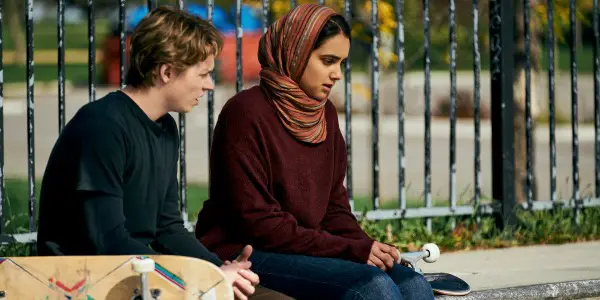
It’s such a big responsibility for any artist of colour to make something in the realm of representing a community whilst being very specific to themselves. I’m not sure we should be burdening every artist with the notion that they speak for their communities because, even within the diaspora – for example Pakistani-Americans and British-Pakistanis – the stories are going to be wholly different. I appreciate you sharing your perspective and a blessing of the film being released worldwide at the same time is that the global diaspora gets to engage with it. Did you see the film Catch Me Daddy?
Minhal Baig: Oh yeah, I haven’t seen it but I saw the trailer.
It was written and directed by white men and the story was about honour killings, about a British-Pakistani woman who runs away with her white boyfriend whilst her family chases after her throughout West Yorkshire. The ending is so depressing.
Minhal Baig: Is it based on anyone’s real story or entirely fictional?
Fictional but based on a real concept. With a film like that, it highlights honor killings as an aspect of British-Pakistani culture that I think can be troubling because we only see ourselves a few times on screen each year. In response, I would point to a film like Hala and say this is much more authentic to our lives.
Minhal Baig: I’m curious to watch it now. I think the easier thing to do is to focus on a political issue and centre the film around that. I don’t know if that was the intention of Catch Me Daddy because I haven’t seen it but there were people who wanted our film to be more explicitly politically-minded. When I say people I mean financiers and executives. When we were trying to get this movie made, there was this feeling that it wasn’t taking a hard stance on things. It’s not making you say, “This is how I feel about Islam” and I was explaining to those people that that’s not what I’m trying to do.
Our existences shouldn’t be defined by political issues. People’s lives are obviously affected by politics and I can’t ignore that that’s a reality – I can’t even say that the movie is apolitical – but I do think there was a confusion by defining these characters outside this sphere. Like “oh, well this is just a coming-of-age story, why do we need to make this one?” I kept pitching that that’s exactly why it needed to be made, so people get to see a story that’s not about a family reacting to 9/11 or…
Honor killings.
Minhal Baig: Yeah. It’s not defined by the things that you assume these people’s lives should be defined by. Even down to things like… there was one point where I was told “I think the family should be Arab.” I said, “Why?” I didn’t understand why people who were not from such groups had these assumptions of what a Muslim family should look and behave like. When the movie was complete, some of the people who had passed on it went to see it and said it was beautiful. (laughs) One of the most difficult things that we have to do as artists of colour is to convince people that our lives have meaning without some dramatic message behind it. It can’t just be a coming-of-age story about someone self-actualising.
I think a film like this can be read as political for precisely those reasons, that this is a subtle reaction against such perceptions. It seems that those people wanted to undermine that subtlety.
Minhal Baig: The same criticism comes from inside of the community too. There’s two sides of it: the outside perspective which is that this film needs to have a reason for its existence and therefore needs to be political, sensational and fit in with some preexisting stereotype, and there’s the criticism from inside that it doesn’t adhere to some of the same ideals. It’s frustrating because there are specific changes we made to our characters to render them as people and not just as avatars for the community. And when they don’t fit in with some of the ideals that people expect, they feel that it’s not good representation.
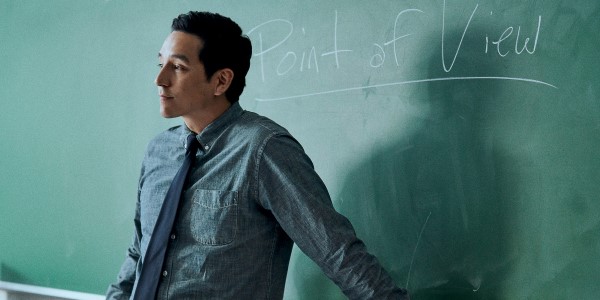
One criticism that I heard is that the father is very patriarchal. That’s true, he is patriarchal but there’s also moments of real connection and I don’t think it’s possible to get one without the other. It’s also a very real issue inside of the diaspora – inside of my own family – and I was trying to depict the specificity and nuance of relating to my father on an intellectual level whilst on other issues he was completely stern. I think it speaks to something that some members of the community would rather not see portrayed on screen, and is thus considered bad representation. One of the things we have to do as artists is to be vulnerable and not always think of the white gaze and not what “outsiders” think of us as Muslims.
When you make something so personal that’s based on your own family to some extent, how do they react?
Minhal Baig: My mom and my sister haven’t seen it yet but my brother recently watched it. I was very surprised because I thought he’d be the last person to see it but he messaged me to say that the movie was incredibly accurate and that the parents were our parents. It was the highest praise you could get from someone who has lived with you and gone through many of the same things. He also said that the film was very risky. (laughs) I think from his point of view, it’s better for us to actually talk about the difficult things than pretend they never happened. It was uncomfortable, I almost didn’t want to speak to him at first, he texted saying “Can I call you?” and I was like, no. (laughs) But his response was very surprising.
Would you say it was cathartic for him as much as it was for you?
Minhal Baig: I think it was cathartic for my brother because we all had to live double lives to some degree. I don’t think our parents were extraordinarily conservative nor extraordinarily progressive but somewhere in between and we were constantly butting heads with them about our choices. As we get older, though, I think they’re understanding why we felt incapable of sharing the truth. My dad came around to the idea that he would rather know than not know even if knowing would make him very upset.
Sometimes I think that films about the Pakistani community might be considered a quiet act of rebellion because, from my observation, we’re not so encouraged to pursue the arts. So when you get a film like this about the complicated relationships within families, it may come from such a place. I have a hard time imagining, for instance, a film set within the Pakistani community like The Souvenir, following a film student or the like.
Minhal Baig: Yeah, there are definitely differences. There probably are Pakistani families like The Souvenir, but I think all our rebellion falls within a different range, doing things like sneaking out of the house or not mentioning where you’re going or having secret relationships. I applied to a certain college in secret because my parents wanted me to go to one that was close to home so I could commute. No unmarried woman in my family had gone away for school – they had all commuted from home. So I knew that was going to be a big issue with my parents because, even as progressive as they were, this was one thing that I knew they would not budge on.
So I applied in secret and found out I got into Yale and I told my dad first because I thought he’d be more understanding. Initially, he was not happy but he came around to the idea and helped me get ready to move and he didn’t tell our mom until a week before I was going to leave, because otherwise she would have given me a hard time about it. When I talked to my guidance counselor about this, they found it hard to understand why my family wasn’t excited about me going to Yale.
The stereotype is that the brown family values education over anything else but, in my family, it’s family over anything else. They care more about me being at home and near them than at Yale. If I’m getting A-’s instead of A+’s, they don’t care. (laughs) That was a difficult thing for people to relate to, I didn’t know anyone else in the same predicament. There was one other Muslim girl in my school and she commuted from home but it was never a question for her, she wanted to do that. That scene in Lady Bird when her mom stops talking to her? That was my life. My mom stopped talking to me for a long time.
I relate to that because my siblings prefer to be close to home, whereas I’m the one who moved away.
Minhal Baig: Are you the middle child?
Second oldest out of five.
Minhal Baig: Kind of the middle then. (laughs)
I think me moving away gave my parents and aunts/uncles confidence in letting their kids move away because it became clear that they wouldn’t turn into devils if they moved out. (laughs)
Minhal Baig: I’m the bad influence now! My younger cousins are excited about going away for school and their parents are so mad at me. They’re like, “You made this, you created this problem.” My family wasn’t that conservative growing up – they were somewhere in the middle – but both my extended families were conservative.
However, even though I say I relate, I’m also not a woman so I can’t speak to if it’ll be the reality for the women in my family too, if they wanted to move away after college in the same independent capacity. The best thing I can do is support them if they choose to do so because I know that their religious compasses wouldn’t suddenly evaporate if they went outside of this sphere.
Minhal Baig: Yeah! The movie recognises the heroine’s journey – there’s the hero’s journey that Joseph Campbell created and the heroine’s journey, which was created much later – which is a much more internal journey. In The Wizard of Oz, Dorothy has the shoes from the start- she has already has what she needs but she’s going on a journey of learning and self-actualisation. It’s the same with a lot of great stories that feature female characters, the women already have what they need inside of them, they just have to find it.
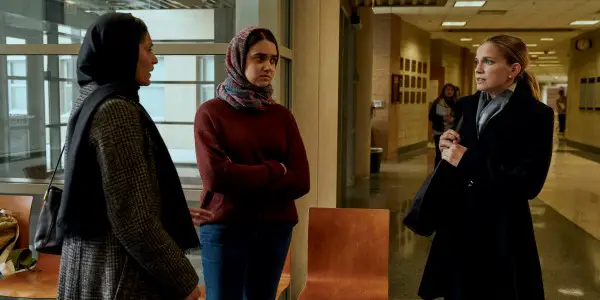
Whereas the hero’s journey is about a hero going on a journey to conquer something to compensate for a weakness or flaw in himself. In our story, the heroine has a lot of things she needs to get closer to where she wants to go but it takes some very difficult circumstances and uncomfortable situations for her to come back around to wherever she is at the beginning except with more knowledge.
I suppose we’ve spoken at length about representation and I want to speak about the craft, because I really admired the film in that regard. Lets begin with the soundtrack, which was quite classical and different from the average American coming-of-age movie. Could you speak to us about the process?
Minhal Baig: I found Mandy Hoffman’s work in this movie called The Lovers by Azazel Jacobs and I fell in love with the composition. It added another dimension to the movie that wouldn’t have been there without it. When I was looking for a composer, it had to be somebody who understood that it should reflect the psychology of this young woman and it had to be different to what you’d expect. When we first sat down to talk about it, I told her I didn’t want any piano. Piano, for me, is very familiar in coming-of-age movies and I wanted to take out that element. At first she wanted to keep using it. (laughs)
I heard the first set of samples and thought, this isn’t working, it’s too whimsical. I saw Hala’s psychology as more yearning and coming into being, rising to the surface, and we kept using those words and started to define what we were going for. The first piece that she composed which I thought completely nailed the tone was the scene in the bus where Hala is writing. We made the other pieces around that.
The piece where Hala’s walking with Jesse behind the school became their theme and the end credits score is a variation of the score when Hala and Jesse are in the cafeteria because it was about, “something unexpected is coming into beginning.” We had samples that were completely digital then we had an actual orchestra do the recording because I talked to the producer about how much I hate digital scores. (laughs) We needed to have an actual violinist playing the violin to make it feel lived-in and real.
I hope you didn’t get any notes about needing to make it sound more “Pakistani”, with plucked strings and a sitar…
Minhal Baig: I never had that comment because I always pitched the movie with this kind of score in mind. It was going to be classical, it wasn’t going to be a big orchestra, it was going to be somewhere between a quartet and a small 30-piece orchestra and it was going to reflect the psychology of this girl. It wasn’t going to be working in parallel with the image but doing something that was changing our relationship with the image.
Would you say this idea for the score was another element retained from when the film was still a short or did it develop along the way?
Minhal Baig: It developed because the short had piano – it’s not like I dislike piano, I just think it gets overused and melodies get overused so that you just like the song and not necessarily what it’s doing for the characters or the story. I’ve found that some of the best composers like Max Richter and Dustin O’Halloran all use piano. They do it in a very evocative way but I think there’s an overuse in American movies. Piano is often a fallback because the image is not doing enough so the score tells you how to feel.
It’s why we get emotional watching the plastic bag in American Beauty. It’s purely because of the piano. (laughs) The plastic bag floating around is kind of an empty image otherwise.
Minhal Baig: It imbues a meaning that’s not already there. In the way that we constructed score, we had to surprise you because the film is an internal experience.
One of the biggest ways you imbue such meaning is through Geraldine Viswanathan’s reactions. Could you talk about directing her and her process? I know that she doesn’t even speak Urdu, which is not something I knew when watching the movie because I believed her performance.
Minhal Baig: She submitted a tape and it was obvious from that first tape that she was the character. We did an extensive search and, to be totally frank, we had a lot of problems with visas following the travel ban. There’s a lot of misunderstanding around casting – for example, it’s even difficult for actors in the UK who haven’t done anything before, to come to America to do an independent movie. I asked specifically for actors who could speak Urdu but a lot of them couldn’t speak it at a level that was believable for the character but also sometimes their performance was much better in English than in Urdu or vice versa.
With Geraldine, I knew she couldn’t speak Urdu so that was an obstacle to casting her but her take on the character was spot on. She also added a layer of levity and charisma that was quite restrained and I think we needed that in the movie because otherwise she’s too self-serious. We did a week of rehearsals and the first set was just myself and each actor one-on-one. At first, it was very daunting with Geraldine because of how much Urdu there was but those were scenes primarily with Eram’s actress Purby Joshi. Once I went through the script with Purby one-on-one too, I put them in a group together and they would do their scenes first in English and then in Urdu. Geraldine practised so many times that she knew what they were saying and could respond in real time.
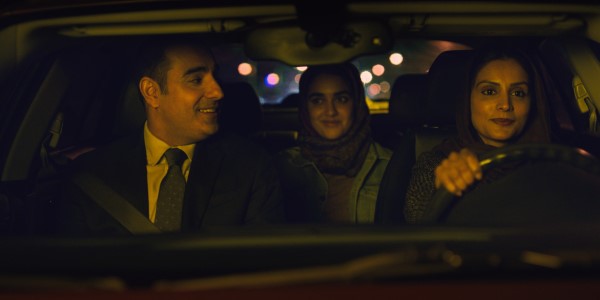
There were also so many scenes that we had to do in a one-shot, so there was no way we could just cut somewhere else if she wasn’t giving me the reaction I needed. Since so much of the film rests on her face and how she reacts to things, it was important that her acting felt organic. She did a lot of rehearsals with Purby and Azad (Khan) on her own and we also had an on-set Urdu consultant who’s actually an academic of Urdu poetry which is a very high level Urdu – he would say certain things that not even I would understand and I would tell him that my Urdu is very conversational and the family has to be speaking at a conversational level.
Her mom was always set to exclusively speak in Urdu and Hala would speak in English, and Hala would speak in English with her dad too who would respond in English, but the parents would speak with each other in Urdu. The consultant was always there on the day to make sure everyone’s Urdu was good and help Geraldine with the very minimal dialogue she does have in Urdu.
Was it in that week of rehearsals where the actors generated the strong family dynamic?
Minhal Baig: Yeah, they spent a lot of time together even when I was not present. I tasked Purby and Azad with making sure Geraldine felt supported because it can be very difficult acting opposite a language you don’t understand, and to practice with her as much as she needed to make it easier. Azad taught her how to do wudhu, which was very nice, and I taught her how to perform namaz. Even though it didn’t feel like a long time to prepare, she did a lot of preparation and, by the time she got on set, she felt like she couldn’t just be herself. The real Geraldine is is pretty far away from her character and I think that was one of the reasons she was drawn to the role.
I want to speak about the design of the house. Did you have to reach into your memories and recreate things or did you work with what was already there?
Minhal Baig: I actually wanted to use my parents house at first but it wasn’t very good for filming. The house we ended up choosing looks exactly like my house on the outside. It was in Skokie, a suburb outside of Chicago, where the houses have a very specific Georgian style with a particular type of windows and arches inside and you can create frames within frames. That’s what I was looking for when we were scouting for locations. We found many houses but this was the one that convinced me the most that the characters had lived in it because it felt small enough and nice enough for the neighborhood.
There were things that we needed – for the living room, I set up the chairs in a way that reminded me of me and my dad, how we would talk to each other side by side. There were some things that were different, like my kitchen was probably a quarter of the size of this one. (laughs) But we had enough space to shoot the scenes specifically, so could have Eram in the back in her domesticity and Azad at the table and Hala coming in from the stairs, for example. We needed a house where we could visually capture that with the three members in different spaces, one in the foreground, one in the centre and one in the background.
A great example of such a shot is one that I previously talked to you about, where three frames have been stitched together to show Hala eavesdropping on her parents conversation in the kitchen. You spoke about David Fincher being an influence in the way he captured domestic space, what were your other influences for the compositions?
Minhal Baig: The biggest ones… man, there are so many. This movie has been very inspired by Fish Tank, even though it’s a very different kind of movie, and A Separation by Asghar Farhadi, for different reasons. For me, Asghar is the greatest living filmmaker and his films capture the lives of people in domestic settings where there are moral grey areas and the conflicts are highly internal and very culturally specific. With Andrea, it’s how she captures the heroine’s journey so beautifully.
The cinematography was largely inspired by 35 Shots of Rum, by Claire Denis. It was a film that our cinematographer Karolina Kosta brought up whilst we were still in the prep stages of the movie, she brought me a bunch of stills and I said “Oh my God, what is this movie?” I hadn’t heard of it but watched it immediately. The warm lighting we got inside of the house and inside Hala’s room was inspired by that movie. The shot of her at her desk was almost… not entirely a lift, but there’s a shot in 35 Shots of Rum which is almost exactly the same in terms of colour temperature. We really liked that there was a softness to the light and it doesn’t call attention to itself.
This camerawork had to be very controlled. As much as I loved Fish Tank and felt that the cinematography suited that character, in this movie we wanted camerawork that was very restrained. There would only be a few times where we’d break away from that, like the scene in the playground which is handheld and where there are jump cuts, which aren’t anywhere else in the movie.
Jada Pinkett Smith is a producer on the film. To what extent was her involvement?
Minhal Baig: She had watched the short film online and really loved it. She wanted to know where the story would go because I had put in the video description that I intended to make a feature. So I met with her to pitch the feature and said, I know that the short film focuses on the romantic story but the bigger story is the one with her family. That’s the one I feel most connected to. It’s not going to be a grand political statement, it has to very emotional and honest to these characters and it’s also largely drawn from my own life.

She felt that, even though the story was very specific and rooted in this specific diaspora and my life, she resonated with it. What she said was that she had not seen this kind of story with this kind of aesthetic before and she really wanted to see those two things together. When she looked at the footage, I think she was surprised because I don’t think she’d seen a film that looked like that with this kind of family. Which is true, because I looked around for references of South Asian American families and I felt that the movies that were closest in tone were the Turkish movie Mustang or Fish Tank. There wasn’t an exact movie I could point to and say, that’s exactly like this.
Yeah, even when you go to Lollywood or Bollywood or any South Asian cinema, the aesthetic is just so different.
Minhal Baig: Yeah but there is actually one movie that I think has maybe changed the trajectory in Pakistan and it’s a film called Cake. Have you seen it?
I have not, I don’t think we get the best distribution for Pakistani films in the UK.
Minhal Baig: The director actually set it in the UK! Maybe this is just my own experience but it was the first time I saw a Pakistani family with that kind of aesthetic. His visual language was understated and humanising, which I thought was very powerful. I think a lot of Bollywood films – a lot of studio films – make it feel larger than life and I think that makes it feel less accessible. Cake didn’t come out in the US for a really long time and I kept trying to find it, I even messaged the director asking how I could watch it. (laughs)
I’ve just seen that it’s on Netflix so thank you for the suggestion.
Minhal Baig: You should watch it! I watched it after I had already shot Hala and I wish I had seen it before because it does some powerful things, like how there is a very strong relationship in the movie that isn’t the one you expect. It’s very surprising, not least because I’ve never seen such a movie come out of Pakistan.
One thing that people are associating Geraldine Viswanathan’s name with – and I think they should perhaps start associating your name with it too – is Ms, Marvel, who will be our first Pakistani-American superhero on screen. Is it of any interest for you?
Minhal Baig: I read Ms. Marvel when it first came out and I fell in love with it, as it very much captured a specific time in my life. There’s a scene of her sneaking out of her home to go to a party and she drinks orange juice and spits it out when she realises it has alcohol in it. (laughs) That felt like a scene that could’ve only been written by someone who had gone through the experience because it was so specific.
It was incredible to read and to know that these stories have resonance beyond just the groups that are being depicted. Because of that universal appeal, I would say Ms. Marvel was an important part in being able to make Hala. I think the way that we have to proceed as filmmakers is that if we’re lucky to be chosen, then it’s an opportunity we should consider. However, I want to write and direct original stories. In some ways, it’s especially hard to do that in this climate, partly because there’s so much out there and it’s difficult to make a film that people haven’t seen before and also one that would get the kind of wide release that Hala did. If there’s a way to continue doing that, though, then I want to do so.
Outside the superhero films, considering the studio system is currently trying to take measures to achieve a greater standard for diversity and inclusion, do you think it’s a realm you will pursue?
Minhal Baig: It’s possible. There have been several original stories this year that have been released by studios, like Queen & Slim and Knives Out. There’s a lot more in independent film but I think there’s a greater chance of me making something now within the studio system than there was many years ago. There’s more of an understanding that there are demographics that haven’t been serviced in cinematic storytelling and there’s an audience for these movies. I’m continuing to write my own stories but I know it becomes less about your own choice – you go out and just hope to get financed.
Is the relationship with Apple one that will be pursued?
Minhal Baig: I had a really good relationship with Apple on this movie and I love that they’re investing in original stories for their platform. I’ll be excited to work with them again. Looking ahead, it’s not that I value theatrical over the streaming experience but I do enjoy the communal theatrical viewing experience and I want that to be a bigger part of my movies if possible and if it makes sense for the movie.
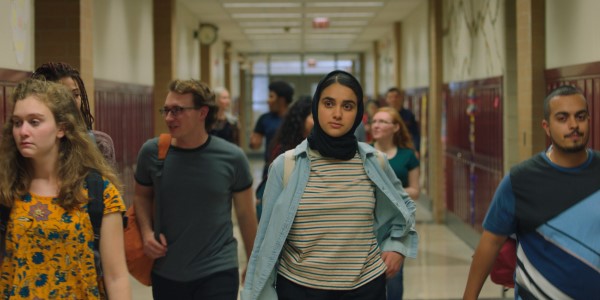
Going back to the reception of the film, I’m curious to know what sort of unexpected, positively surprising reactions you’ve received from people around the world following the global drop.
Minhal Baig: Yeah, I get a lot of messages and there are a lot of people who relate to the movie who are very private about their lives and I expected that. There’s a girl, who is a mother, who wrote, “Thank you for this incredible movie. Still in tears and still overwhelmed by what I’ve just watched. It feels like a throwback to my teenage years when I was growing up as a Turkish girl in Switzerland. Yes, this movie would have helped me in my teens and seeing Hala’s pain and desperation made me go through all the emotions again. But it helped to see that I’m not alone and for that I’m incredibly grateful.” A lot of people who have reached out aren’t from the same background – even though they may not be Pakistani or American, it’s the same idea of living between two cultures that resonates.
The point you made about people who are private resonating the most – I’m in the same boat too and even felt nervous about putting that forth in this interview. Thank you so much for the conversation, I just have one final question. Can you tell us about anything you’re working on next?
Minhal Baig: Yeah, I’m currently in the writer’s room for a Netflix show called The Magic Order based on Mark Millar’s comics of the same name and it’s about a magical family that’s getting taken out one by one and they have to find out how and why. And there’s a movie I want to make set in the 90’s in the Chicago public housing projects – specifically Cabrini-Green – which is about two kids who are each other’s best friends who are rendered apart after something happens. That’s the next movie I hopefully get to make, we’re still looking for financing so fingers crossed.
I wish you all the best for it, I appreciate your film and your voice in cinema.
Thank you so much, I appreciate it.
Film Inquiry thanks Minhal Baig for taking the time to speak with us. Hala is available worldwide via Apple TV+.
https://www.youtube.com/watch?v=4aS-qGHH6E0&t=13s
Does content like this matter to you?
Become a Member and support film journalism. Unlock access to all of Film Inquiry`s great articles. Join a community of like-minded readers who are passionate about cinema - get access to our private members Network, give back to independent filmmakers, and more.
Musanna Ahmed is a freelance film critic writing for Film Inquiry, The Movie Waffler and The Upcoming. His taste in film knows no boundaries.













